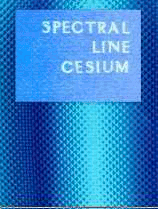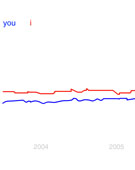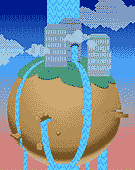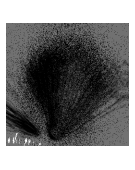Spectral Line Cesium is virtual flash mob scheduled for May 15th, 2010 at Noon (Central Standard Time), the goal of which is to make the phrase "Spectral Line Cesium" the most searched term on Google for that hour. To participate in the event one searches the term "Spectral Line Cesium" at Noon (CST) on May 15th, 2010 using the Google search engine. In short, this project is virtual flash mob the location of which is Google's Search Box on any computer in any browser.
As an event, Spectral Line Cesium is intended to explore notions of inclusion and exclusion. On the one hand, access to the internet is completely inclusive: anyone who can open a browser and navigate to Google's search page can participate. Indeed, the project requires the participation of as many people as possible to succeed. Hence, the concept itself imposes very few barriers to accessibility. On the ...
Full Description
Spectral Line Cesium is virtual flash mob scheduled for May 15th, 2010 at Noon (Central Standard Time), the goal of which is to make the phrase "Spectral Line Cesium" the most searched term on Google for that hour. To participate in the event one searches the term "Spectral Line Cesium" at Noon (CST) on May 15th, 2010 using the Google search engine. In short, this project is virtual flash mob the location of which is Google's Search Box on any computer in any browser.
As an event, Spectral Line Cesium is intended to explore notions of inclusion and exclusion. On the one hand, access to the internet is completely inclusive: anyone who can open a browser and navigate to Google's search page can participate. Indeed, the project requires the participation of as many people as possible to succeed. Hence, the concept itself imposes very few barriers to accessibility. On the other hand, the very idea of searching a bizarre phrase like "Spectral Line Cesium" for no other reason than to participate in an web-based conceptual art event will no doubt appeal to few.
Because the Spectral Line Cesium event requires participation on a mass scale to succeed, it is situated in an unusual dynamic compared to other works of conceptual art, most of which is fated to be seen by at most a handful of people because it is shown nowhere other than at art galleries. No work of contemporary or conceptual art has ever been more searched online than, for example, the name "Jessica Simpson." I take this strange fact to be evidence that there is something about the making and practice of art excludes the art objects in general and conceptual art in particular from mass culture, a kind of built-in albeit unintentional exclusivity.
Spectral Line Cesium is a sort of primitive groan in the space created by the technology of mass communications, an assertion that we are aware of what is happening to our ways of talking to each other: the only thoughts that have relevance are those that generate a sufficient level of interest on the mass scale and that the only meaningful words are those that are spoken to millions. Our ability to command the attention of the millions gives us legitimacy in another sort of conversation, one that cannot be engaged in but by people who know how to speak to each other from the platform of mass communications.
Terms searched through Google have structure and meaning and narrative distilled into at most a few words. We have all learned, since the invention of the search engine, to write correctly for the search box: too many words, or the wrong words, return results not of little value. Whether the words entered into the search box yield the correct results depends on how the search engine's algorithms rank information. A badly chosen search term might yield, from the point of view of the algorithms governing the search, numerous exact hits none of which were the intended target of the search. The algorithms behind the search are not, however, made explicit. One approaches the search box with an intuitive sense of what works well and what does not. "Spectral Line Cesium" is an attempt to engage with this new sort of writing.
Search terms entered into search engines are documents, texts about which very little (if any) literary theory has has been written. While they are not necessarily intentionally written for publication, in fact search terms are published in unique ways. First, content is written into websites (tags, for example) to increase the likelihood that certain search terms will attract the attention of searchers. Second, the major search engine companies (Google, Yahoo, Bing) publish lists of the most commonly or popularly searched terms. So, while a teenager in Des Moines is not intending to "publish" a phrase that he or she searches, in actual practice the fact that millions of people end up searching the exact same phrases/subjects leads to the terms that led the most people to the "correct" information is recorded (and content is subsequently developed in such a way as to conform with what is being searched).
Our usual ideas of what an author is (the paradigm: a single individual producing an original text on a blank sheet of paper) do not apply to this kind of writing. Many people acting independently must enter the same terms (or very nearly the same) for the search term to achieve publication. I conceive of "Spectral Line Cesium" to be a sort of poetical/rhetorical object that can only be written by many thousands of people simultaneously. No individual acting alone could author such a text, but each participant must write it for it to achieve the intended status of text. It seems to me that collective texts of this sort have hitherto only been written by accident.
Work metadata
- Year Created: 2010
- Submitted to ArtBase: Monday Mar 1st, 2010
- Original Url: http://sites.google.com/site/pythagoreanmetronome/home/spectral-line-cesium
- Permalink: http://sites.google.com/site/pythagoreanmetronome/home/spectral-line-cesium
-
Work Credits:
- Thomas, creator
Take full advantage of the ArtBase by Becoming a Member





